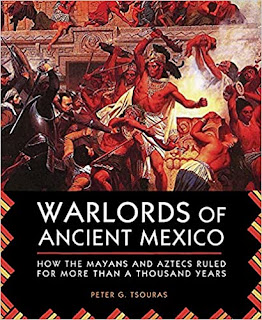Book Review - Five Stars
Warlords of Ancient Mexico: How the Mayans and Aztecs Ruled for More Than a Thousand Years by Peter J. Tsouras
Imperialism was brought to Mexico by the Aztecs who were not builders, creators or innovators but exploiters. Bloody war with human sacrifice and cannibalism was brought by the invading Toltec who influenced the Aztecs and next brought their blood letting sport to the Yucatecan Mayan.
Next Inquisition crazed Cortés a military leader, who finished driving the Moors out of the Iberian Peninsula ending a 700 year war, took on the Aztec empire using Spanish military tactics.
Read this amazing book and learn how this all was accomplished.
Excerpts:
Cuitláhuac, the ninth emperor or tlatoani of the Mexica, inflicted the greatest single defeat on European arms in the entire conquest of the Americas when he drove Cortés and his combined Spanish and native army out of Tenochtitlan in 1520, killing over 1,200 Spaniards and 4,000-5,000 Indian allies.
Spanish tongues could not pronounce Náhuatl words. Cortés consistently mangled names. Cuauhnahuac (Near the Trees) became Cuer-navaca. Tollan became Tula. I have tried to use the spelling that most closely corresponds to the original name, hence Huexotzinco instead of Huexotzingo and Tlaxcallan instead of Tlaxcalla.
Cortés reinforced his own contingent and divided it into three separate elements, each of which had as many as 10,000 allies attached. A few desperate Mexica escaped to tell Cortés that each night a horde of people picked over the ruins for something to eat. He ambushed them in the early dawn, killing over 800 women and children, a stratagem in which he took much pride.
the Mexica were dying daily of hunger by the thousands
Alvarado captured a district of the city with a thousand houses; the allies butchered the 12,000 inhabitants of the district against orders. As victory beckoned, Cortés found he had less and less control of his native allies, who were determined to exterminate the Mexica. The city was resembling a vast slaughter house, and the actual perpetrators of the Mexica genocide were their own fellow Indians.
Now instead of Tlaxcallan barbarities, they suffered the gauntlet of Spanish greed.
Women were stripped to find any gold hidden on them. Young men were branded for slavery, and the comely, light-skinned young women carried off. Spanish mastiffs were set upon the priests to tear them to pieces.
Review by John M. Grimsrud

